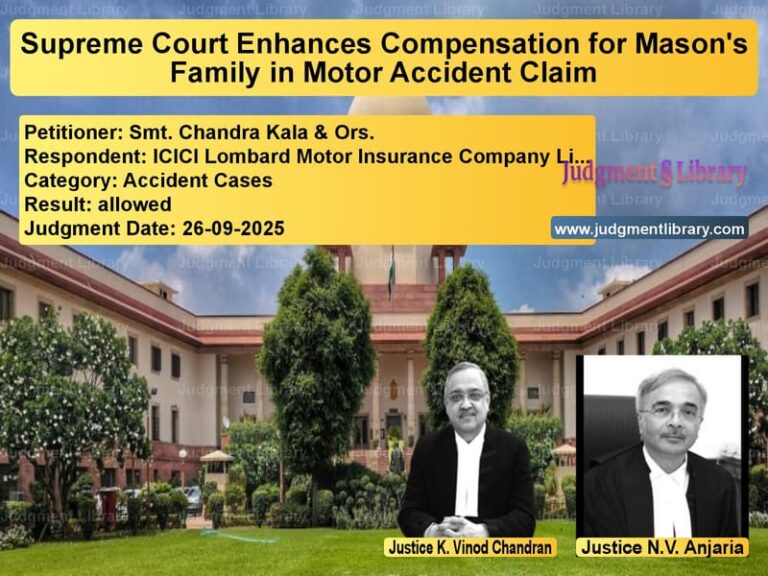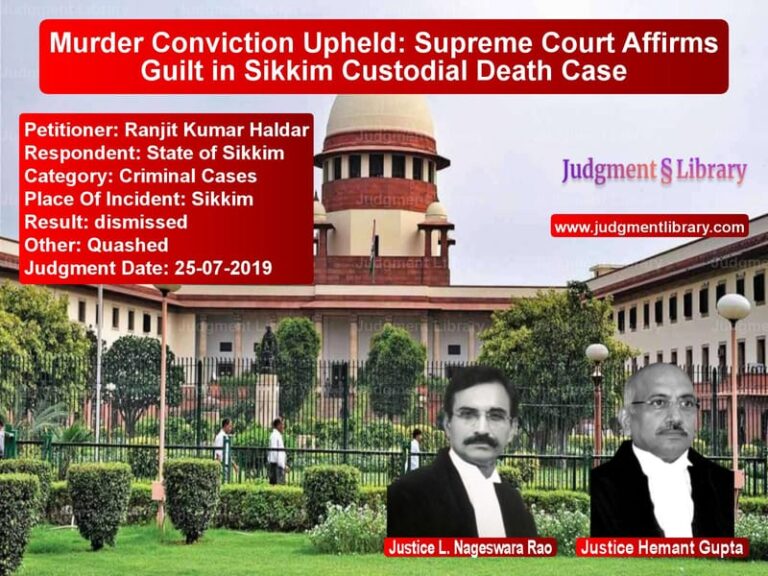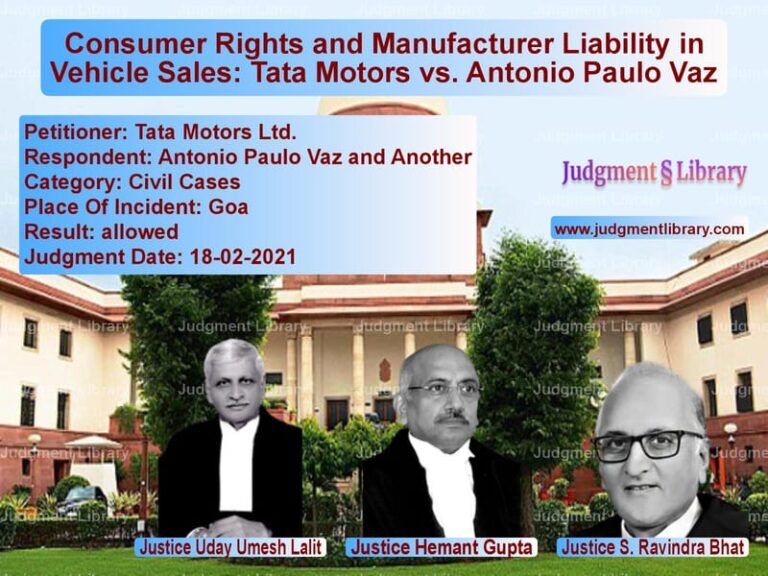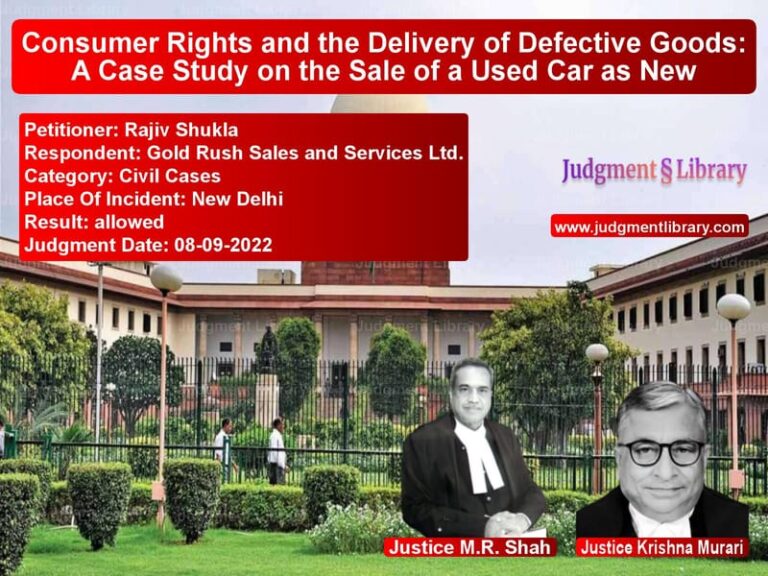Cheating and Forgery in Commercial Transactions: Supreme Court Reinstates Criminal Proceedings
The case of V. Ravi Kumar vs. State, Rep. by Inspector of Police, District Crime Branch, Salem, Tamil Nadu & Ors. deals with the intersection of commercial disputes and criminal offenses like cheating and forgery. The Supreme Court was called upon to determine whether the Madras High Court was correct in quashing a criminal case under Sections 420, 409, 468, 471, and 120B of the Indian Penal Code (IPC), citing it as a civil dispute.
The appellant, a trader in cotton ginning and yarn conversion, accused the respondents of criminal breach of trust by failing to return cotton lint supplied for processing into yarn. The respondents argued that the matter was a commercial dispute and should not be criminalized.
Background of the Case
The dispute arose when the appellant alleged that the respondents, who managed Sri Rajendran Mills Ltd., failed to return processed yarn after receiving raw cotton. The case’s timeline is as follows:
- In December 2001, the respondents requested the appellant to supply cotton lint for conversion into yarn.
- A Memorandum of Understanding (MoU) was executed in January 2002.
- The appellant supplied 1,03,920 kgs of cotton lint to the mill.
- Instead of returning the yarn, the respondents allegedly sold the lint and misappropriated the proceeds.
- On May 20, 2004, the appellant lodged a complaint with the local police station.
- The police failed to register an FIR, prompting the appellant to seek court intervention.
- The Judicial Magistrate directed the police to investigate under Section 156(3) of the CrPC.
- Due to the high value of the transaction, the case was transferred to the District Crime Branch and registered as Crime No. 54 of 2005.
- In response, the respondents filed a petition under Section 482 CrPC before the Madras High Court to quash the FIR.
- The High Court quashed the criminal proceedings on March 20, 2006, citing the dispute as commercial in nature.
- The appellant challenged the High Court’s order in the Supreme Court.
Legal Issues Considered
The Supreme Court examined the following questions:
- Can a commercial dispute involving allegations of cheating and forgery be quashed under Section 482 CrPC?
- Does the mere existence of a contractual relationship preclude criminal liability?
- At what stage can a High Court interfere in a pending criminal investigation?
Arguments by the Appellant
The appellant argued that the respondents had committed a criminal offense. Their key contentions were:
- “The respondents misappropriated the supplied cotton instead of converting it into yarn, amounting to criminal breach of trust under Section 409 IPC.”
- “The respondents forged documents and used them fraudulently, which falls under Sections 468 and 471 IPC.”
- “The High Court overstepped its jurisdiction by quashing the case before trial, without considering the evidence.”
- “There was clear fraudulent intent, which distinguishes the case from a mere breach of contract.”
Arguments by the Respondents
The respondents argued that the dispute was purely civil and should not have led to a criminal prosecution. Their main points were:
- “The dispute arose out of a business transaction and should be resolved through civil litigation.”
- “There was no intention to deceive at the inception of the transaction, which is necessary for proving cheating.”
- “The High Court correctly exercised its powers under Section 482 CrPC to prevent abuse of the legal process.”
Supreme Court’s Observations and Judgment
The Supreme Court, comprising R. Banumathi and Indira Banerjee, overturned the High Court’s decision and reinstated the criminal proceedings. The Court held:
“A mere breach of contract is not a criminal offense, but fraudulent or dishonest intention at the inception of the transaction is an essential ingredient for cheating.”
The Court provided the following reasoning:
- The FIR contained allegations of forgery, misrepresentation, and fraudulent inducement, which could not be dismissed as a mere contractual breach.
- At the stage of quashing an FIR, the High Court should not conduct a detailed factual analysis.
- The presence of criminal elements meant that the case should proceed to trial.
- Cheating occurs when deception is present at the beginning of a transaction, as alleged by the appellant.
The Supreme Court further clarified:
“The correct forum to determine whether the allegations are true or false is the trial court, not a quashing petition under Section 482 CrPC.”
Implications of the Judgment
The Supreme Court’s ruling has critical legal implications:
- It establishes that contractual disputes involving fraud and misrepresentation can lead to criminal prosecution.
- It limits the power of High Courts to quash criminal cases at the preliminary stage.
- It protects complainants from premature dismissal of their legitimate grievances.
Final Decision
The Supreme Court set aside the High Court’s order and reinstated the criminal proceedings. The Court emphasized:
“The police investigation must continue, and the trial court should determine the culpability of the accused based on the evidence.”
This judgment ensures that allegations of fraud and misrepresentation in commercial transactions receive due consideration in criminal law, reinforcing the principle that civil and criminal remedies can coexist when both elements are present.
Petitioner Name: V. Ravi Kumar.Respondent Name: State, Rep. by Inspector of Police, District Crime Branch, Salem, Tamil Nadu & Ors..Judgment By: Justice R. Banumathi, Justice Indira Banerjee.Place Of Incident: Salem, Tamil Nadu.Judgment Date: 14-12-2018.
Don’t miss out on the full details! Download the complete judgment in PDF format below and gain valuable insights instantly!
Download Judgment: V. Ravi Kumar vs State, Rep. by Inspe Supreme Court of India Judgment Dated 14-12-2018.pdf
Direct Downlaod Judgment: Direct downlaod this Judgment
See all petitions in Fraud and Forgery
See all petitions in Extortion and Blackmail
See all petitions in Judgment by R. Banumathi
See all petitions in Judgment by Indira Banerjee
See all petitions in allowed
See all petitions in supreme court of India judgments December 2018
See all petitions in 2018 judgments
See all posts in Criminal Cases Category
See all allowed petitions in Criminal Cases Category
See all Dismissed petitions in Criminal Cases Category
See all partially allowed petitions in Criminal Cases Category







